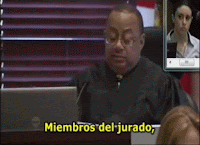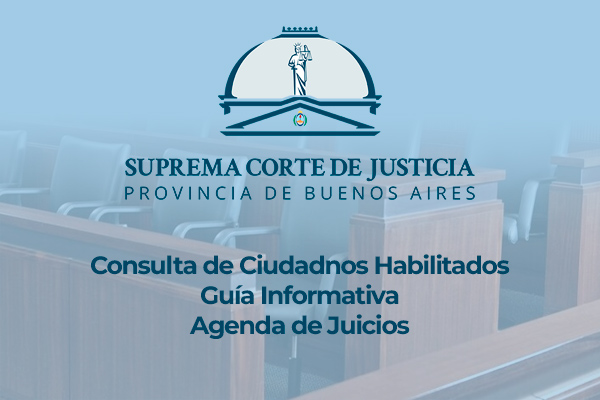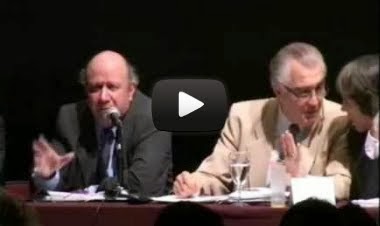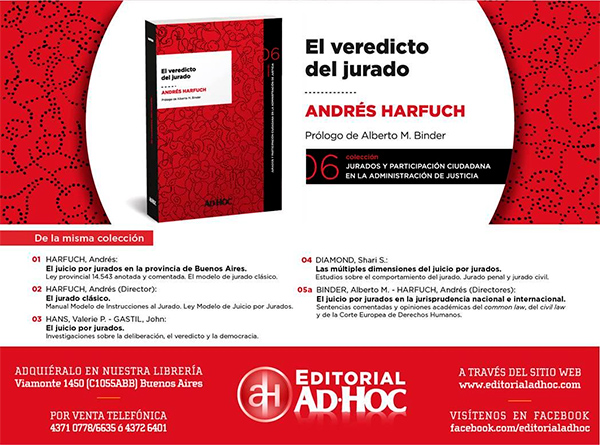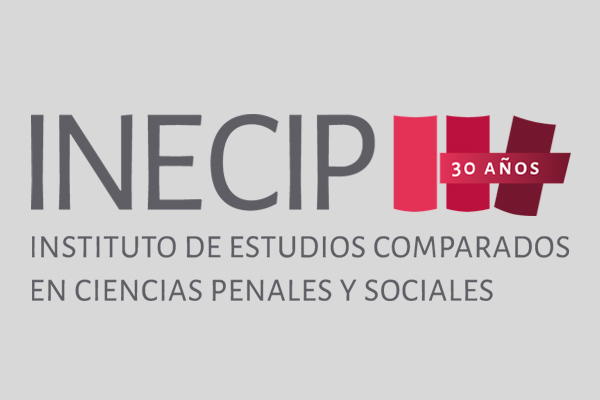 |
| Attorney General Julio Conte Grand. |
In an Opinion of the Attorney General for the Province of Buenos Aires, AG Julio Conte Grand recognized that a jury verdict of not guilty cannot be appealed by the prosecution or the complainant.
In Argentina, the complainant can act as a party (a private prosecutor) and, on this basis, the complainant (known as the “querellante) attempted to appeal a not guilty verdict in the notorious “El Camping Durazno” case.
The Attorney General’s Opinion establishes the policy for his Office, which represents almost one third of the population of the nation, that a jury verdict of not guilty is final and cannot be appealed by the state prosecutor or a private prosecutor.
The Supreme Court must now decide the matter, but the AG’s Opinion removes the state’s opposition to respecting the voice of the citizen jurors.
The Opinion changes the criminal procedural landscape in Argentina and brings the Province of Buenos Aires one step closer to a coherent adversarial system of trial by jury.
The AG’s twelve-page opinion strongly criticized the reasoning of two of the judges from the BA High Court of Appeals (BA HCA) which had allowed the appeal and overturned the verdict. AG Conte Grand labeled their views «arbitrary» and a «blatant deviation from the law.»
«I concur with the defence on two grounds: firstly, that the procedural rule is being applied beyond its intended scope, and secondly, that as a result, an arbitrary reasoning emerges, rendering the contested judgement invalid as a judicial act.”
AG Conte Grand agreed with the defense that the not guilt verdicts could not be appealed and therefore demanded that the defense attorneys’ appeal be granted, the Appeals’ Court ruling be nullified, and the acquittals rendered by the jury be confirmed. He stated in plain terms that there is no possible appeal by the prosecutor or complainant against the not guilty verdict rendered by the jury.
Now, the only remaining step is for the Supreme Court of Buenos Aires to render its judgment.
The Opinion reflects a major consolidation of the jury system and is consistent with with one of the most memorable pronouncements in our legal history regarding the double jeopardy guarantee, as exemplified in the 1975 opinion of the Attorney General of the Argentine Nation in the case entitled «María Estela Martínez de Perón Exceptional Instance of Res Judicata (Opposed in C. No. 3150/75) S.C.C. 548, Vol. XVII.»
Even without a jury system, the Attorney General of the Nation stated during the 1974-1977 period:
«There is unanimous agreement in legal doctrine, both procedural and constitutional, that the so-called material effect of res judicata is rooted in the respect for individuals who have already endured state persecution, preventing the reiteration of the exercise of punitive claims when the outcome of the initial process has proven unsatisfactory.»(see Opinion AG 1974-77)
The Attorney General regards the judgement of the BA High Court of Appeals as arbitrary, as it blatantly departs from the explicit language of Article 371 quáter, subsection 7, of the Criminal Procedure Code (which prohibits nullifying a not guilty verdict). Furthermore, it diverges from the precedents established by the Supreme Court of Justice of the Province of Buenos Aires (SCJPBA) and the BA High Court of Appeals itself, regarding not guilty verdicts of the jury as unappealable..
Not only that, but he dismantled the primary argument behind the contentious annulment decreed by Judges Violini and Borinsky of the BA HCA.
At that time, these two judges, ex novo, entered a directed verdict of nullification against the not guilty verdict of the jury because the circuit judge, Fabián Riquert, allegedly denied the Legal Guardian for Minors and Incapacitated Individuals the opportunity to participate in the testimony of the minor during the trial.
These two judges deemed this to be «a clear infringement on the rights granted to the young victim to have specialized assistance, as stipulated by the regulations, and a violation of due process that inevitably leads to the nullification of the trial» (see)
The Attorney General directed specific criticism at this maneuver. By simply examining the trial video, he asserted that «the Legal Guardian for Minors and Incapacitated Individuals did participate in the trial and was present at the time of the testimony of the minor victim.»
DOWNLOAD ATTORNEY GENERAL OPINION
The defense teams appealed to the Supreme Court of Justice of the Province of Buenos Aires (SCJPBA) and achieved widespread support through amicus curiae submissions from leading legal personalities and organizations in Argentina. (see amicus curiae).
The Public Defense of the Province of Buenos Aires and the judges from the internationally renowned Trial of the Military Juntas in 1985 -León Arslanian, Guillermo Ledesma, Jorge Valerga Aráoz, and Ricardo Gil Lavedra- also joined the amicus curiae submissions, highlighting the finality of the jury´s verdict. (see).
 |
| Judges Guillermo Ledesma, Ricardo Gil Lavedra, León Arslanian y Jorge Valerga Aráoz |
«The jury’s determination to withhold political authorization for the exercise of punitive power remains unalterable, and I contend that this does not introduce an imbalance between the involved parties in the proceedings, as the situations of the accused and the complainant are not equivalent,» asserted the Attorney General in one of the most noteworthy passages of his opinion.
CASE BACKGROUND
The case is currently in the phase of analysis and deliberation by the Supreme Court of Buenos Aires, addressing the appeals filed by the defense teams of the three young individuals—Lucas Pitman, Tomás Jaime, and Juan Cruz Villalba. This comes after two judges of the BA HCA, against the contrary jurisprudence of its own Court and the Supreme Court, chose to annul the jury’s acquittal and mandated a new trial at the end of 2021.
In this context, Attorney General Julio Conte Grand issued his opinion, recommending that the Supreme Court uphold the appeals submitted by the defense, represented by lawyers Martín Bernat and Noelia Agüero. He proposes nullifying the BA HCA´s ruling and, consequently, restoring the not guilty verdict of the jury.
MAIN ARGUMENTS OF THE ATTORNEY GENERAL OPINION
Conte Grand’s principal argument centers on the regulation governing jury trials, which explicitly states that the complainant—representing the victim or their family—lacks the power to appeal a not guilty verdict of the jury.
«The BA HCA’s departure from legal doctrine on this matter becomes strikingly evident», remarked the Chief Prosecutor of the Province in his opinion.
Highlighted passages from the opinion:

